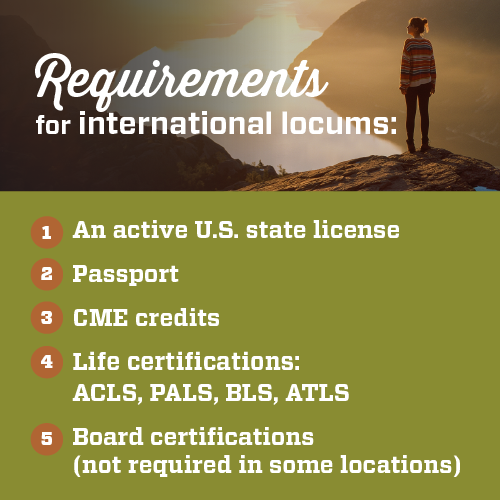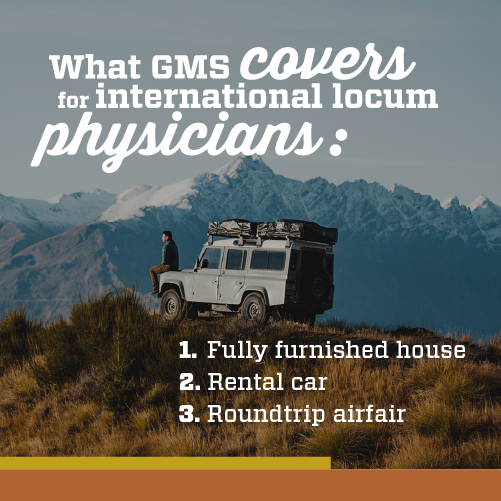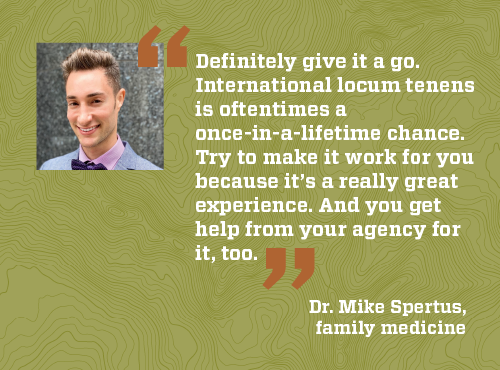
You’ve spent years in school, then training, and now you’re faced with a decision: What do I do after residency? Some physicians want to settle into a hospital job or physician group immediately. But others want to explore their practice options and maybe even travel the world. If the latter appeals to you, international locum tenens might be right for you!
Family medicine physician Dr. Samantha Conroy took an international locum tenens assignment in New Zealand right out of residency. She says what she learned on assignment will serve her well for the rest of her career. “Working in remote communities really stretched me in terms of being comfortable with my training. When you don’t have all these tests at your fingertips, you must rely more on your exam and your clinical judgment and make decisions based on what you see in front of you. It does help you become a better doctor.”
If you have an adventurous spirit, international locum tenens is a great way to stretch your wings after residency. Here are five things to know about this physician career alternative.
Globe trotters: Physicians share why they worked international locums out of residency
1. Start planning for locum tenens early
Locum tenens work requires preparation and planning; international locums requires even more. For example, licensing may be as quick as two weeks for some international locums assignments, like the Caribbean Islands. Other international locations, like Australia and New Zealand, can take up to four months to get a license. Additionally, you’ll need visas for many international destinations.

Additional requirements needed for international locum tenens work:
- An active U.S. state license
- Passport
- Board certification (in some locations, this isn’t required)
- Life certifications: ACLS, PALS, BLS, ATLS
- CME credits
It’s a good idea to connect with a locum tenens agency specializing in international locums before you’ve completed your residency. That way, you’ll have an established relationship with a recruiter who will know you and what you’re looking for once you’ve completed your training. They can also help guide you so you’re more prepared when you start your assignment.
2. Consider the length of assignment you’re interested in
While you can find domestic locums assignments that are as short as a weekend, international assignments can last anywhere from two weeks to a year or more.
For example, the minimum length of an international assignment in U.S. territories like Guam or the U.S. Virgin Islands is two weeks. In other countries, like New Zealand, Jamaica, and Canada, healthcare facilities need locum physicians to commit to a minimum of six months.
Get the full guide and watch a webinar: Locum tenens for residents and fellows
3. International locum tenens pay
One important consideration for residents considering working internationally is that locums pay is usually lower in other countries than what physicians can earn domestically. Most residents have student loans they want to start paying down right away, so they may be hesitant to take on work that pays less. However, there are options on how to alleviate that concern. Here are three ways to mitigate the onus of student loan debt while on an international locums assignment:

1. Grace
A grace period is a time in which student loan payments are not required. Interest continues to accrue on unsubsidized loans; however, the government pays the interest on subsidized loans.
2. Deferment
Deferment is another option for a temporary suspension of student loan payments. During a deferment, interest does not accrue on subsidized loans because the federal government pays the interest.
3. Forbearance
Another way to postpone student loan payments is through a forbearance. During this time, no monthly payments are required (or sometimes borrowers will choose to make smaller payments); however, both subsidized and unsubsidized loans accrue interest, and the borrower is responsible for the accrued interest.
Despite the lower pay, physicians who’ve worked international locum tenens out of residency say that the experience was worth it.
“When you’re working international locums, I feel like you pay more for the experience; that’s your pay,” says hospitalist Dr. Gabrielle Johnson, who’s worked an international assignment in Guam. “You don’t get paid as much, but you’re in an amazing location.”
4. If you have family or pets

If you have family or pets who might travel with you on assignment, there are things you’ll want to plan for if you’re interested in working international locum tenens. There are several things to know:
- You and your family will need passports and visas for locations not in U.S. territories. Locum agencies like GMS cover the visa cost for you and will arrange them for you and your family, but you’ll be required to cover the cost of your family member’s visa.
- If you have school-aged children, you’ll need to consider schooling, especially if you’re on longer assignments. Some physicians on longer international locums assignments choose to homeschool their kids.
- Agencies typically only cover airfare for the locum physician, so you’ll be responsible for paying for your family member’s or pet’s travel expenses.
- If you have a furry friend, you’ll want to weigh whether you want to bring your pet. Many international locations require a period of quarantine for pets, so if you have an older pet, you may not want to subject them to a month or more in quarantine. If you won’t be traveling with your pet, you’ll want to consider who will care for them while you’re gone.
5. Connect with a locums agency that specializes in international locum tenens
Since there’s quite a bit of preparation that goes into working an international assignment, having the support of an international locums agency will make the entire process smoother. There are many locum tenens agencies to choose from, but very few place locum physicians internationally. Global Medical Staffing (GMS) has been leading the field for over 30 years, and our specialty- and location-specific recruiters get to know you and your preferences and can find you the perfect assignment.

Some of the benefits of working international assignments with GMS:
- GMS covers the cost of fully furnished housing for each physician
- Rental car is provided
- GMS provides roundtrip airfare for the physician. If you decide to bring your family along, you will need to pay for your family members’ flights, but GMS can help with the bookings.
In addition to these benefits, GMS covers malpractice insurance, takes care of licensing, assists and prefills credentialing apps as much as legally allowed, and secures your visa.
Since GMS also staffs domestically, they can find you a locum tenens assignment stateside if needed while waiting for licensing and credentialing to be completed, ensuring you have an uninterrupted income stream between international assignments.
A once-in-a-lifetime opportunity
Although there’s a lot to consider and prepare to work international locum tenens, particularly right out of residency, most physicians say they would do it all over again — for many reasons.
Dr. Mike Spertus, a family medicine physician who worked a locums assignment in Australia right out of residency, says his advice is to try it.

“Definitely give it a go. International locum tenens is oftentimes a once-in-a-lifetime chance. Try to make it work for you because it’s a really great experience. And you get help from your agency for it, too.”
Want to learn more about international locum tenens? Give us a call at 1.800.760.3174 or view today’s international locum tenens job opportunities



 Back
Back